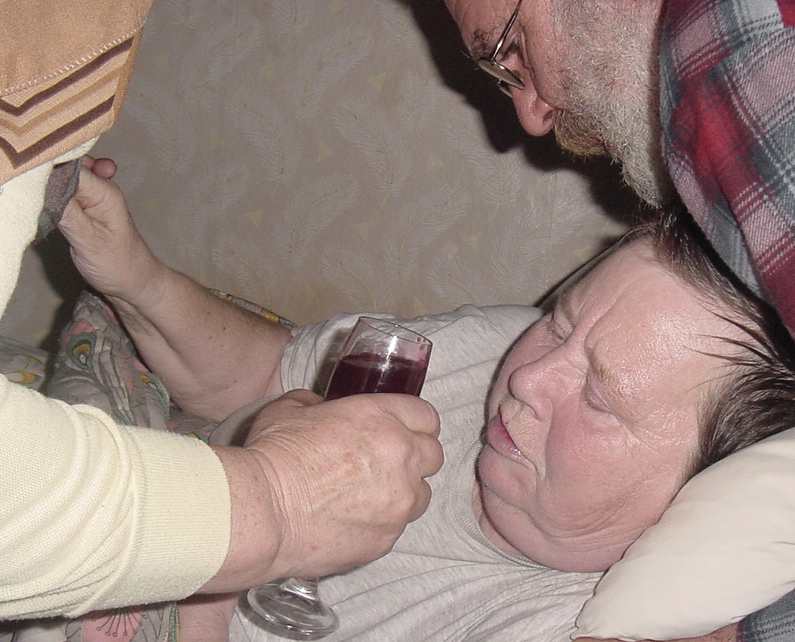Bible Basics: Contents
Part 1: "The things concerning the Kingdom of God" Study 1: God 1.1 The Existence Of God || 1.2 The Personality Of God || Belief In Practice 1: Knowing God || 1.3 God's Name And Character || Belief In Practice 2: Grace (John Parkes) || Belief In Practice 3: The All Seeing God || Belief In Practice 4: God Is Omnipotent || Belief In Practice 5: Responding To The One God || 1.4 The Angels || Belief In Practice 6: God As Creator || Digression 1: God Manifestation || Digression 2: Why The Trinity Was Accepted || Study 1: Questions Study 2: The Spirit Of God 2.1 Definition || 2.2 Inspiration || 2.3 Gifts Of The Holy Spirit || 2.4 The Withdrawal Of The Gifts || 2.5 The Bible The Only Authority || Digression 3: Is The Holy Spirit A Person? || Digression 4: The Principle Of Personification || Belief In Practice 7: The Implications Of Inspiration || Study 2: Questions Study 3: The Promises Of God 3.1 Introduction || 3.2 The Promise In Eden || 3.3 The Promise To Noah || 3.4 The Promise To Abraham || 3.5 The Promise To David || Belief In Practice 8: Covenant Relationship With God || Study 3: Questions Study 4: God And Death 4.1 The Nature Of Man || 4.2 The Soul || 4.3 The Spirit || 4.4 Death Is Unconsciousness || 4.5 The Resurrection || 4.6 The Judgment || Belief In Practice 9: Judgment Now || 4.7 The Place Of Reward: Heaven Or Earth?|| 4.8 Responsibility To God || 4.9 Hell || Digression 5: Purgatory || Digression 6: Ghosts And Reincarnation || Digression 7: The 'Rapture' || Belief In Practice 10: The Motivational Power Of Understanding Death || Study 4: Questions Study 5: The Kingdom Of God 5.1 Defining The Kingdom || 5.2 The Kingdom Is Not Now Established || 5.3 The Kingdom Of God In The Past || 5.4 The Kingdom Of God In The Future || 5.5 The Millennium || Digression 8: The Kingdom Of God Now (Graham Bacon) || Belief In Practice 11: What The Kingdom Of God Means Today || Study 5: QuestionsStudy 6: God And Evil 6.1 God And Evil || 6.2 The Devil And Satan || 6.3 Demons || Digression 9: The Implications And Origin Of The Belief In A Personal Satan || Digression 10: Witchcraft || Digression 11: What Happened In Eden? || Digression 12: Lucifer || Belief In Practice 12: Battle For The Mind || Study 6: Questions
Part 2: "The things concerning...the name of Jesus Christ" (Acts 8:12) Study 7: The Origin Of Jesus. 7.1 Old Testament Prophecies Of Jesus || 7.2 The Virgin Birth || 7.3 Christ's Place In God's Plan || 7.4 "In the beginning was the word" || Digression 13: Jesus The Son Of God (Michael Gates) || Digression 14: Did Jesus Create The Earth? || Belief In Practice 13: Jesus Didn’t Pre-exist: And So What? || Study 7: Questions Study 8: The Nature Of Jesus 8.1 Introduction || 8.2 Differences Between God And Jesus || 8.3 The Nature Of Jesus || 8.4 The Humanity Of Jesus || 8.5 The Relationship Of God With Jesus || Belief In Practice 14: The Real Christ || Digression 15: How The Real Christ Was Lost || Digression 16: The Divine Side Of Jesus || Study 8: Questions Study 9: The Work Of Jesus 9.1 The Victory Of Jesus || 9.2 The Blood Of Jesus || 9.3 Jesus As Our Representative || 9.4 Jesus And The Law Of Moses || 9.5 The Sabbath || Digression 17 The Crucifix || Digression 18: Was Jesus Born On Dec. 25th? || Belief In Practice 15: The Meaning Of Christ’s Resurrection For Us || Belief In Practice 16: Christ Died For Me- So What Should I Do? || Belief In Practice 17: The Real Cross || Belief In Practice 18: The Inspiration Of The Cross || Study 9: Questions || Study 10: Baptism Into Jesus 10.1 The Vital Importance Of Baptism || 10.2 How Should We Be Baptized? || 10.3 The Meaning Of Baptism || 10.4 Baptism And Salvation || Digression 19: Re-baptism || Digression 20 The Thief On The Cross || Belief In Practice 19: The Certainty Of Salvation || Study 10: Questions Study 11: Life In Christ 11.1 Introduction || 11.2 Holiness || 11.2.1 The Use Of Force || 11.2.2 Politics || 11.2.3 Worldly Pleasures || 11.3 Practical Christian Life || 11.3.1 Bible Study || 11.3.2 Prayer || 11.3.3 Preaching || 11.3.4 Ecclesial Life || 11.3.5 The Breaking Of Bread || 11.4 Marriage || 11.5 Fellowship || Study 11: Questions ||


 Along with prayer and Bible reading, regular obedience to Christ’s command to break bread and drink wine in memory of his sacrifice is vital. “... do this in remembrance of Me”, Jesus commanded (Lk. 22:19). It was his wish that his followers should regularly do this until his second coming, when Jesus will share the bread and wine with them again (1 Cor. 11:26; Lk. 22:16-18). The Lord Jesus gave Paul a specific revelation regarding the breaking of bread just as He did concerning the resurrection (1 Cor. 11:23 cf. 15:3); the breaking of bread is that important.
Along with prayer and Bible reading, regular obedience to Christ’s command to break bread and drink wine in memory of his sacrifice is vital. “... do this in remembrance of Me”, Jesus commanded (Lk. 22:19). It was his wish that his followers should regularly do this until his second coming, when Jesus will share the bread and wine with them again (1 Cor. 11:26; Lk. 22:16-18). The Lord Jesus gave Paul a specific revelation regarding the breaking of bread just as He did concerning the resurrection (1 Cor. 11:23 cf. 15:3); the breaking of bread is that important. A suitable order of service for the breaking of bread is as follows.
A suitable order of service for the breaking of bread is as follows.